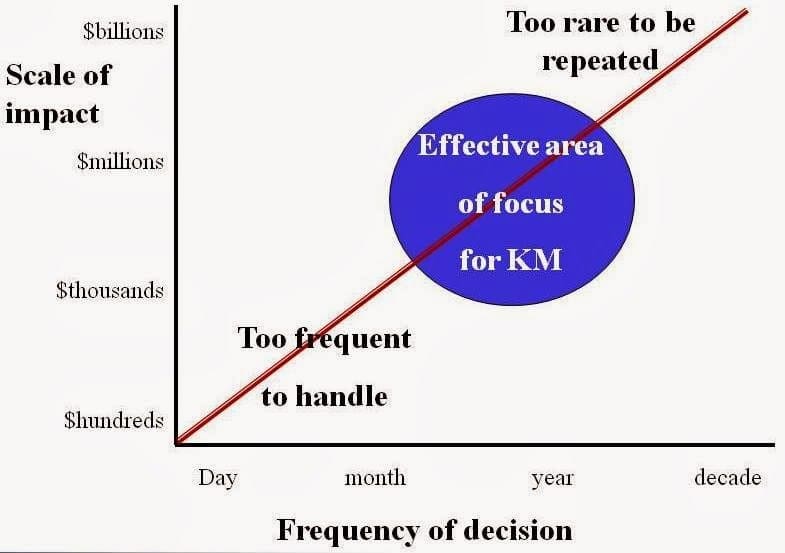
Favorite There is a strong argument that the purpose of Knowledge Management is decision support. But which decisions should KM support? Peter Senge tells us that Knowledge is the ability to make effective decisions, and the new ISO standard 30401:2018 tells us that knowledge is “human or organizational asset enabling effective
Read More
 Shared by Nick Milton February 4, 2019
Shared by Nick Milton February 4, 2019

Favorite It’s always good to cross-check our KM programs against lists of failure and success factors. Here are two pretty comprehensive lists. Two of the most popular posts on this blog are “Top 7 tips for Knowledge Management Success” and “Top 7 reasons why Knowledge Management implementations fail.” I
Read More
 Shared by Nick Milton November 27, 2018
Shared by Nick Milton November 27, 2018

Favorite Here are the first 5 steps in a successful KM journey Buffalo, NY by JasonParis, on Flickr At Knoco, we have seen enough Knowledge Management implementation programs by now to know that there a few key steps every organisation needs to take in the beginning. These steps are as
Read More
 Shared by Nick Milton October 26, 2018
Shared by Nick Milton October 26, 2018

Favorite Very often we hear people talking about the failure of KM as a discipline, and asking “Why hasn’t it caught on after all these years?” It’s an interesting question, but it’s the wrong question. It’s an interesting question, but it’s the wrong question. People asking the question are often
Read More
 Shared by Nick Milton October 12, 2018
Shared by Nick Milton October 12, 2018

Favorite Knowledge Management can be started quickly, but takes a long time to fully embed. Here are two sources of data that show exactly how long. Over the past few years we have helped many organisations to benchmark their “current status” of Knowledge Management. They ask for this for a number of
Read More
 Shared by Nick Milton July 9, 2018
Shared by Nick Milton July 9, 2018

Favorite According to one article, there are 3 main traps a KM implementation can fall into. Traps, by Paul Asman and Jill Lenoble, on Flickr The article is in a study on Enabling Communities of Practice at EADS-Airbus. One of the articles in this study, by Marleen Huysman and Dirk
Read More
 Shared by Nick Milton July 6, 2018
Shared by Nick Milton July 6, 2018

Favorite This post from the archives describes a strange statement from a client, and some of the thoughts it raised for me at the time. “Today we get married to Knowledge Management” That was the, shall we say, “unusual” statement made by the convener of a KM seminar that I
Read More
 Shared by Nick Milton February 6, 2018
Shared by Nick Milton February 6, 2018

Favorite There are 4 legs on the Knowledge Management table. Are you investing evenly in each of them? Knowledge Management requires equal attention to the four key enablers of People, Process, Technology and Governance. The test of whether you truly are paying equal attention is whether your KM program investments
Read More
 Shared by Nick Milton January 11, 2018
Shared by Nick Milton January 11, 2018

Favorite Many Enterprise Social Network adoptions have stalled. What lessons can we draw for Knowledge Management? Enterprise Social Networking (ESN) technologies such as Yammer, Slack and Facebook for Business are often introduced on the same premise as Knowledge Management – that these technologies will allow staff to share knowledge, collaborate,
Read More
 Shared by Nick Milton January 10, 2018
Shared by Nick Milton January 10, 2018

Favorite Here are some useful lessons on KM implementation. Taken from this article, here’s some lessons on KM implementation from the Hoffman-LaRoche experience. I quote “First, managers hoping to make a difference through better knowledge management should start by focusing on the right problem. Patricia Seemann chose a spot that
Read More
 Shared by Nick Milton October 26, 2017
Shared by Nick Milton October 26, 2017
![]() Shared by Nick Milton February 4, 2019
Shared by Nick Milton February 4, 2019









